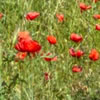
15 Activities for Late-Stage Alzheimer's Disease
Found In: ›Activities ›Articles ›Alzheimer's & Dementia

Golden Carers has 1000s of activities and resources for senior care.
Alzheimer's Disease affects people in different ways. Rather than focusing on the disease and impairment, we should aim to identify each person's strengths and remaining abilities and find activities to support these.
Alzheimer's disease progresses slowly and typically in 3 stages: early-stage (mild), middle-stage(moderate), and late-stage (severe).
The rate at which the disease progresses varies from person to person. Some may live as long as 15 years with Alzheimer's Disease whilst others less than half of that. The average life expectancy is around 8 years from diagnosis.
This article concentrates on activities for people living with late-stage Alzheimer's Disease.
Related: Alzheimer's Disease vs Dementia
Typical changes observed in late-stage Alzheimer's Disease
Significant emotional and behavioural changes occur at this stage. Changes include:
- Vulnerability to other illnesses such as pneumonia
- Language and reasoning difficulties - minimal or no speech
- Severe memory loss
- Impaired walking or rigidity
- Difficulty with swallowing
- Lack of focus/concentration
- Possible unusual behaviour; passive or otherwise
Finding suitable activities for late-stage Alzheimer's
The care needs for clients living with late-stage Alzheimer's Disease concentrate on preserving dignity, comfort and quality of life. Activities should focus on the senses: sight, touch, smell, hearing, and taste.
Activities for late stage Alzheimer's should be stimulating but without challenges. Choose activities that are repetitive and divide them into small tasks. Conduct activities with compassion, patience, sensitivity, and respect.
Realistic expectations are important. Don't feel disheartened if motivation/engagement is not there when an activity is offered, come back and try again later.
Always consult with clinical senior staff before running activities for clients with late-stage dementia.
Related: 30+ Sensory Activities for people living with Dementia
15 Activities for Late-Stage Alzheimer's Disease
The following activities are one-on-one and should be offered in bursts of 15 minutes.
Take into consideration the background of each client to search for themes that might please, alert or engage them.
Consult with clinical senior staff regarding the health status of each client before activity. Be aware that clients may place inappropriate items in their mouths; supervision at all times is necessary.
- Sensory Books
Provide colourful sensory books to look at and touch.
Related: Sensory Lap Quilt - Stuffed Toys
Offer stuffed toys to cuddle. - Pet Therapy
Provide a real puppy or a cat to pat and spend some time with.
Related: Pet Therapy in Nursing Homes - Hand Massage
Give your client a hand massage with lotion and a few drops of essential oils.
Related: Hand Massage & Nail Care - Physical Contact
Brush hair, hold hands.
Related: Comfort Activities - Photo Albums
Look at family photo albums.
Related: Tips for one-on-one Visits with Seniors - Sensory Bean Bags
Provide small bean bags made of different fabric textures: cotton, velvet and silk, and filled with different grains.
Related: Balloon Bean Bags - Music & Movies
Foster emotional connections via music, videos, and movies. Clients may only watch/listen for 5 to 10 minutes but if they are engaged you are providing precious quality of life.- Comedy: The Marx Brothers, Laurel & Hardy, Charlie Chaplin and Buster Keaton or Abbott & Costello, Dean Martin & Jerry Lewis
- Music: Music of the era when clients were 20 or 30 years old.
Swing dance music, Big Bands, Glen Miller, Crosby, The Andrews Sisters.
Note: If your client is younger you would offer 1960's and 1970's material e.g. Australians would love to hear 'The Seekers'. - Movies: Casablanca, Lassie Comes Home, How Green Was My Valley, Waterloo Bridge, Gone with the Wind, Heidi.
Related: Free Music Playlists for Seniors
- Scent stimulation
Put a diffuser in the bedroom with their favourite scent.
Related: Vaporisation Activity and Aromatherapy Inhalations - Bird watching
Sit in the garden where they can see birds pecking at a seed tray.
Related: Bird Watching - Sunshine & fresh air
Sit together in the sunshine to enjoy the sights and sounds for 10-15 minutes. Make sure the person has a wide brim hat, and sun lotion on arms and legs. Avoid the sun between 11 and 3 pm. Offer cool drinks.
Related: Sunshine & Song
- Matching Colours
Break instructions into small tasks, and wait for each task to end e.g. Ask client to pass you the red lids and put the red container nearby and then wait.
Related: Matching Colours Activities - Read Aloud
Research indicates that people with Alzheimer's Disease may be able to hear until very late into the illness. Read articles in magazines and newspapers that the person enjoyed in former times. - Sight Stimulation
Change the visuals inside bedrooms on a regular basis: posters, pot plants, family photographs, fresh flowers, mobiles and celebration decorations to make the person feel loved, and included.
Related: Sensory Stimulation with Wind Chimes
- Watch a game of Sports
Watching sports on TV can still be enjoyable. Decorate the room with the colours of their favourite team. Bring in sporting equipment such as a balls (cricket, baseball, soccer) or a leather glove to touch, feel and smell. Sing part of a sports anthem and see if you get any signs of recognition. Bring a couple of enlarged picture of famous sports people to show and talk about.
Good Luck!
Related: 20 Practical Activities for People Living with Alzheimer's Disease
We'd love to hear your feedback!
Do you have any activities for late-stage Alzheimer's to share?
Related Activities
Save time with 1000's of meaningful
activity ideas for every occasion.
Comments Post a Comment


 12th Feb 2022
Activity Director
12th Feb 2022
Activity Director
Thank you for your ideas
Also if course show about dogs and cats. Lucky Dog is a good one. The voice tones are always kind and the animal handling by the trainer and the people he delivers their new dog to is very engaging. He just seems like a really good and sincere guy. But anything David Attenborough put out; things like this they love. Even though animals are killed for god it doesn’t seem to bother them like human violence. (Human violence shows bother me too)
In the same level there are children’s shows like Happy Feet and Minions they like (Minions II was really about humans). And on Netflix Tiny Creatures, Penguin Town and Animal. These are somewhat more geared to children but not insulting to adult intelligence either.

 26th Feb 2021
Activity Director
26th Feb 2021
Activity Director
Have you tried the activities listed here suggested by others or in the article??
Are you looking for a group activities or one to one activities??


 16th Oct 2020
Activity Director
16th Oct 2020
Activity Director
It sounds like you have some great ideas
Remember those with late stage dementia have a very short attention span so you may have to do short activities but have a rest time to
Food usually is a good tool because most people like to eat
Perhaps you can find some simple recipes or make some simple things like pudding
https://www.goldencarers.com/search/#stq=pudding&stp=1

 16th Oct 2020
Activity Director
16th Oct 2020
Activity Director
Why not try a simple cooking activity like making pudding
https://www.goldencarers.com/search/#stq=pudding&stp=1
 31st Dec 2020
Caretaker
31st Dec 2020
Caretaker
I have been working with HomeInstead since March of this year as well. I too have a client with late stage Alzheimer's. I also have been having her fold the small towels. She also likes helping me put the towels and clothing items away. I think it helps her feel like she is still putting in to the household chores. I also will gather the small pictures in the room I am cleaning and spray a little windex on the paper towel and have my client clean them. She enjoys looking at the pictures, we will talk about them and again she feels that she is helping.
I love this site, it has been a big help in finding great ideas for keeping my clients engaged.


 11th Oct 2020
Activity Director
11th Oct 2020
Activity Director
How wonderful that you accessed this website
There are many activities here that will help you
Please let me know if you have any questions


 21st Nov 2019
Activity Director
21st Nov 2019
Activity Director
 12th Aug 2019
12th Aug 2019
 28th May 2018
28th May 2018
 20th Nov 2019
Speech Language Pathologist
20th Nov 2019
Speech Language Pathologist

 19th Jan 2018
Volunteering
19th Jan 2018
Volunteering
Thank you
 21st Jan 2018
21st Jan 2018
 17th Dec 2017
17th Dec 2017
 2nd Mar 2017
Activity cordinator
2nd Mar 2017
Activity cordinator
Thanks for your ongoing contributions to my caring abilities.
We have introduced memory boxs, therapy doll, and a breathing cat. These activities work well When service users have become distressed.
I feel it is important to get the individuals personal history so that you can work on this to introduce activities that they would be interested in.
We as a team are always looking at ways to stimulate our service users and any new ideals would be very beneficial.
 19th Jan 2017
Diversional Therapist
19th Jan 2017
Diversional Therapist

 7th Nov 2016
7th Nov 2016

 4th Feb 2016
Diversional Therapist
4th Feb 2016
Diversional Therapist

 4th Feb 2016
Care worker
4th Feb 2016
Care worker
 2nd Feb 2016
Lifestyle co-ordinator
2nd Feb 2016
Lifestyle co-ordinator
 2nd Feb 2016
2nd Feb 2016
 2nd Feb 2016
Carer / Activity Coordinator
2nd Feb 2016
Carer / Activity Coordinator

 The Magic of Being Silly
The Magic of Being Silly
 How to start a Garden Club for Seniors
How to start a Garden Club for Seniors
 15 Ways To Honor Veterans And Their Families All Year Long
15 Ways To Honor Veterans And Their Families All Year Long
 How to Plan a Trivia Night
How to Plan a Trivia Night

 Canada
Canada
I plan on trying several of the ideas many of you have mentioned! Thank you again!! This is an invaluable resource!!